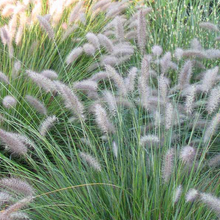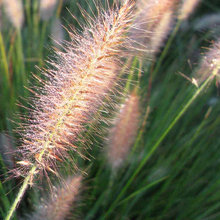Pennisetum 'Cassian' is a compact graceful ornamental grass prized for its fine texture and multi season interest. It forms tidy mounds of narrow green foliage that turn a rich golden hue in fall. In late summer soft tan flower spikes emerge above the foliage adding airy movement and architectural interest. Cold hardy and adaptable, it blends seamlessly into mixed borders, naturalized meadows, or as a soft contrast to bold perennials.
Height & Spread: 30 - 36 in x 24 - 30 in
Bloom Time: Late summer to early fall
Light Requirements: Full sun
Soil Preference: Well drained, average to sandy soil
Watering Needs: Low once established
Deer Resistance: Rarely browsed due to narrow leaf blades
Native Status
This cultivar is derived from Pennisetum alopecuroides, which is native to parts of Asia. Though not native to North America, it performs reliably in temperate climates and is non invasive.
WILDLIFE & INSECTS
Birds
- Seed heads attract finches and sparrows in fall and winter providing a valuable food source when other resources are scarce.
Beneficial Insects
- Offers habitat and protection at the base of its clumps for ground beetles and overwintering predatory insects.
Spacing & Landscape Use
Spacing Recommendations:
- Space 24 - 30 in apart to accommodate mature width and allow for airflow between plants.
Landscape Placement:
- Excellent for mass plantings, edging paths, or mixing with colorful perennials. Adds softness and texture to modern and naturalistic designs alike.
Companion Plants
- Perovskia atriplicifolia (Russian Sage) - Wispy lavender flower spikes complement the soft tan plumes and upright grass form.
- Coreopsis verticillata 'Zagreb' - Low mounds of golden blooms provide a bright base layer for ornamental grasses.
- Echinacea purpurea 'Magnus' - Broad pink blooms contrast beautifully with the narrow arching foliage.
- Rudbeckia fulgida 'Goldsturm' - Golden yellow daisies echo the warm tones of the grass's fall foliage and flowers.
- Salvia nemorosa 'Caradonna' - Deep violet spikes provide vertical structure and attract pollinators all summer long.



